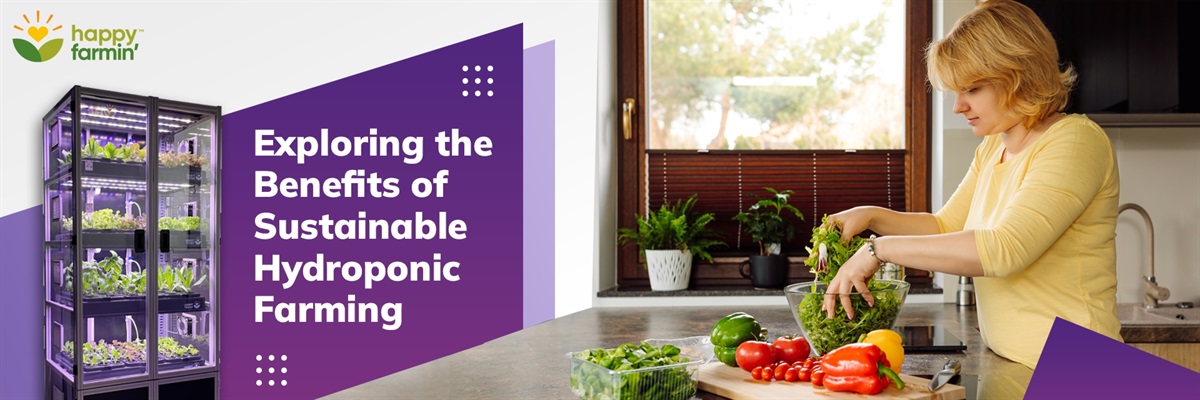
Sustainability and efficiency are two of the most important factors in agriculture today. As the world population continues to grow, we need to find ways to produce more food with fewer resources. Hydroponics farming is one way to achieve this goal, by utilizing water and nutrients more efficiently and reducing the use of pesticides and herbicides. In this blog, we will explore the benefits of hydroponic farming and why it is the way to go for sustainable agriculture.
What is hydroponic farming?
Hydroponic farming is a way of producing plants that do not require soil and instead rely on nutrient-rich water. The plants are typically grown in containers or trays, and the water is circulated through the system to provide the necessary nutrients. The roots of the plants are supported by a growing medium, such as perlite, vermiculite, or coconut coir.
Hydroponic farming has been around for centuries, with evidence of the Aztecs and ancient Egyptians using hydroponic methods to grow crops. However, it is only in recent years that hydroponic farming has become more popular, thanks to advances in technology and a growing demand for sustainable agriculture.
Why is hydroponic farming the way to go?
Water efficiency
Hydroponic farming uses significantly less water than traditional farming methods, as the water is recycled and reused. This is particularly important in regions where water is scarce or expensive. Hydroponic systems also eliminate the need for irrigation, which can waste water through evaporation and run-off.
Nutrient efficiency
Hydroponic systems deliver nutrients directly to the roots of the plants, which means that less fertilizer is required overall. This is because plants can absorb nutrients more efficiently, resulting in faster growth and higher yields. In addition, hydroponic systems can be designed to recycle nutrients, further reducing the amount of fertilizer needed.
Space efficiency
Hydroponic farming is a highly space-efficient method of agriculture, as the plants can be grown in vertically stacked trays or containers. This means that a smaller footprint of land can produce a greater yield than traditional farming methods. In addition, hydroponic systems can be used in urban areas or other locations where space is limited.
Reduced pesticide use
Because hydroponic systems are typically grown in a controlled environment, pests, and diseases can be more easily managed without the use of harmful chemicals. This means that hydroponic farming can reduce the overall use of pesticides and herbicides, resulting in a healthier and more sustainable food system.
Year-round production
Hydroponic systems can be designed to produce crops year-round, regardless of the weather or season. This means that farmers can produce fresh, locally-grown produce even in regions with harsh winters or hot summers. In addition, hydroponic systems can be used to grow crops that are not traditionally grown in a particular region, expanding the range of available products.
So what do we offer you?
Happy Farmin is a revolutionary concept in the field of sustainable agriculture that has the potential to transform the way we grow and consume food. It is a smart, innovative appliance that brings the farm to your doorstep, allowing you to grow fresh, nutritious, and pesticide-free produce in the comfort of your home, restaurant, or hotel.
Hydroponics is the key to Happy Farmin's success. It is a method of growing plants without soil, using a nutrient-rich water solution. This technique not only saves water but also eliminates the need for pesticides, making it an eco-friendly and sustainable way to grow food.
The Happy Farmin appliance allows you to grow over 50 different crops across four categories - greens, herbs, edible flowers, and microgreens. The appliance is designed to be easy to use, intelligent, and seamless, making it accessible to everyone, regardless of their level of gardening experience.
One of the most significant benefits of Happy Farmin is that it allows you to grow food 2-3 times faster than traditional farming methods, with 90% less water consumption and minimal effort. This means you can have fresh produce at your fingertips all year round, without the need for pesticides or harmful chemicals.
The concept of Happy Farmin is a game-changer in terms of sustainability. By growing your food, you reduce your carbon footprint, as you are not contributing to the environmental impact of transporting and packaging food. Moreover, you can be sure that the produce you consume is fresh, nutritious, and free of any harmful chemicals or pesticides.
Conclusion
Hydroponic farming is the way to go for sustainable agriculture. It is a highly efficient and space-efficient method of growing crops, using less water and fertilizer while reducing the use of pesticides and herbicides. With advances in technology, hydroponic farming has become more accessible and affordable, and it offers a promising solution to the challenges facing our food system today.
Happy Farmin is a sustainable solution to the challenge of growing fresh, nutritious food in an urban environment. It is an innovative concept that has the potential to transform the way we consume food, by enabling us to grow our own produce, 2-3 times faster, and with minimal effort. Happy Farmin' is not just a farming appliance, but a way of life that promotes healthy, sustainable living.
